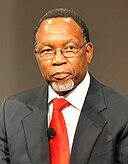
Mosima Gabriel "Tokyo" SexwaleVenda: [sexwále]; is a South African businessman, politician, anti-apartheid activist, and former political prisoner. Sexwale was imprisoned on Robben Island for his anti-apartheid activities, alongside figures such as Nelson Mandela. After the 1994 general election—the first fully democratic election in South Africa—Sexwale became the Premier of Gauteng Province. He served in the government of South Africa as Minister of Human Settlements from 2009 to 2013.

Nkosazana Clarice Dlamini-Zuma, sometimes referred to by her initials NDZ, is a South African politician, medical doctor and former anti-apartheid activist. A longstanding member of the African National Congress (ANC), she currently serves as Minister in the Presidency responsible for Women, Youth and Persons with Disabilities and is the Chancellor of the University of Limpopo.

Baleka Mbete is a South African politician who was the Deputy President of South Africa from September 2008 to May 2009. She was also the Speaker of the National Assembly for two non-consecutive terms from 2004 to 2008 and from 2014 to 2019. A member of the African National Congress (ANC), she was first elected to the National Assembly in 1994 and stepped down from her seat in 2019.
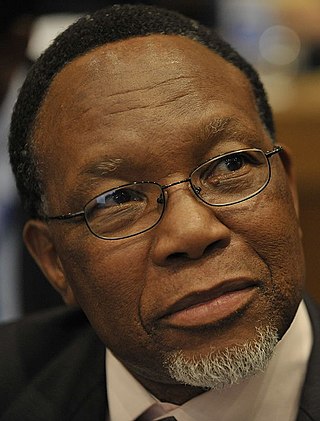
Kgalema Petrus Motlanthe is a South African politician who served as the third president of South Africa from 25 September 2008 to 9 May 2009, following the resignation of Thabo Mbeki. Thereafter, he was deputy president under Jacob Zuma from 9 May 2009 to 26 May 2014.
The 52nd National Conference of the African National Congress (ANC) was held in Polokwane, Limpopo, from 16 to 20 December 2007. At the conference, Jacob Zuma and his supporters were elected to the party's top leadership and National Executive Committee (NEC), dealing a significant defeat to national President Thabo Mbeki, who had sought a third term in the ANC presidency. The conference was a precursor to the general election of 2009, which the ANC was extremely likely to win and which did indeed lead to Zuma's ascension to the presidency of South Africa. Mbeki was prohibited from serving a third term as national President but, if re-elected ANC President, could likely have leveraged that office to select his successor.
The National Executive Committee (NEC) of the African National Congress (ANC) is the party's chief executive organ. It is elected every five years at the party’s national conference; the executive committee, in turn, elects a National Working Committee for day-to-day decision-making responsibilities. At the NEC's head is the president of the ANC, and it also contains the other so-called "Top Seven" leaders : the deputy president, chairperson, secretary-general, two deputy secretaries-general and treasurer-general.
The 51st National Conference of the African National Congress (ANC) was held at the University of Stellenbosch in Stellenbosch, Western Cape, from 16 to 20 December 2002, during the ANC's 90th anniversary. President Thabo Mbeki was re-elected to the party presidency and, notably, there was no change in other five top leadership positions except for Deputy Secretary General. There was also little competition for other spots on the National Executive Committee (NEC). This ANC conference has thus been called "the quietest in its history."

Samson Gwede Mantashe is a South African politician and former trade unionist who is currently serving as the Minister of Mineral Resources and Energy. He was Minister of Mineral Resources from February 2018 to May 2019, when his current portfolio was created. He is also serving his second term as the national chairperson of the African National Congress (ANC).

Fikile April Mbalula is a South African politician who has been the Secretary-General of the African National Congress (ANC) since December 2022. He was a cabinet minister between 2010 and 2023, most proximately as Minister of Transport from 2019 to 2023.

Paul Shipokosa Mashatile is a South African politician who is the 9th and current deputy president of South Africa. He became deputy president of the governing African National Congress (ANC) in December 2022. Before his election to that position, he was ANC treasurer-general from December 2017 and acting ANC secretary-general from January 2022.
Mathole Serofo Motshekga is a South African lawyer and politician who was elected to his third consecutive term as a Member of Parliament in the 2019 general election. He formerly represented his political party, the African National Congress (ANC), as the second Premier of Gauteng.
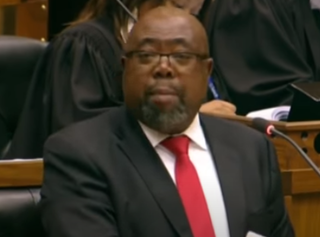
Thembelani Waltermade "Thulas" Nxesi is a South African politician and former trade unionist who has been the Minister of Employment and Labour since May 2019. A representative of the African National Congress (ANC), he has been a member of cabinet since October 2011 and the Deputy National Chairperson of the South African Communist Party (SACP) since July 2012.

Thandi Ruth Modise is a South African politician who is currently serving as the Minister of Defence and Military Veterans. She was previously the Premier of the North West from 2010 to 2014, Chairperson of the National Council of Provinces from 2014 to 2019, and Speaker of the National Assembly from 2019 to 2021.
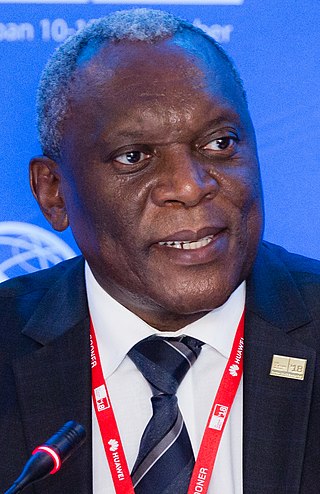
Siyabonga Cyprian Cwele is a South African politician who served in the cabinet of South Africa from September 2008 to May 2019, most recently as the Minister of Home Affairs between 2018 and 2019. He was appointed as the South African Ambassador to China in December 2020. He is a member of the African National Congress (ANC) and represented the party in Parliament from 1994 to 2019.
Kopeng Obed Bapela is a South African politician who is currently serving as the Deputy Minister of Public Enterprises since 6 March 2023. Before that, he was Deputy Minister of Cooperative Governance and Traditional Affairs from 2014 to 2023. A member of the African National Congress (ANC), he has been a member of the National Assembly since 2002 and a deputy minister since 2010.
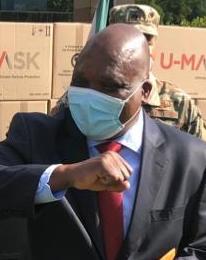
Mathume Joseph Phaahla is a South African politician who is currently serving as the Minister of Health since August 2021. He was formerly the Deputy Minister of Health from May 2014 to August 2021. He had been a deputy minister since May 2009, when he joined the National Assembly. He is also a member of the National Executive Committee of the African National Congress (ANC).
Pamela Tshwete is a South African politician from the Eastern Cape. She is currently serving as Deputy Minister of Human Settlements since August 2021. She has been a member of the National Assembly since 2002 and a deputy minister since 2013.
Ncediso Goodenough "Zizi" Kodwa is a South African politician and communications strategist who is currently serving as the Minister of Sports, Arts and Culture since March 2023. Before that, he was the Deputy Minister of State Security from 2019 to 2023. He was formerly the national spokesperson of the African National Congress (ANC) from 2014 to 2018.
The 55th National Conference of the African National Congress (ANC) took place from 16 to 20 December 2022 at the Johannesburg Expo Centre in Nasrec, Gauteng. Attended by 4,426 voting delegates, the conference elected the party's 87-member National Executive Committee, including the party's top officials – for the first time known as the Top Seven, rather than the Top Six, after the conference amended the party's constitution to introduce a second deputy secretary-general position. Delegates also adopted resolutions on the party's governance and policy positions, with consideration of the outcomes of the ANC's 6th National Policy Conference, held in late July 2022.
Fébé Potgieter-Gqubule is a politician from Eastern Cape, South Africa. She has held various positions in public entities and in her political party, the African National Congress (ANC).

